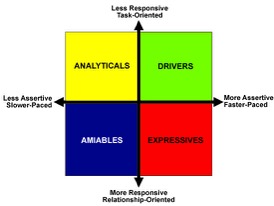By now we all know the 4 personality types:
- Analytical
- Driver
- Amiable
- Expressive
Even though we know them, how much time do we spend deciding which type the person we are talking to is? Probably not much. If we did, the way we deal with them would probably be different. A lot of the time we like to treat people the way we would like to be treated. When it comes to talking to people, we often do the same thing. Unfortunately, that isn’t always the best approach.
By not changing up your style you can be missing out on crucial connections. There is a ton of information out there on personality types. I won’t go into the nitty gritty here, but I will discuss what you might come up against and how to avoid traps when dealing with personality types.

Figuring out personality types may take some time. If the person you are talking to is an extreme of any the types, it will be easy. More difficult would be the moderate personality or someone who is a combination of type. The following types and traps are what to do when communicating to these personalities.
The Analytical
When talking PPC with the Analytical you want to provide as much of the information this person is likely to want. These discussions should be stat heavy and although relationship building is important to all personality types, asking the Analytical how it felt to go on their summer vacation is probably not going to get you anyway here. Try to nail down what KPI’s are the most important to their business before discussing any results.
Analytical Traps
When discussing the data, the Analytical can get bogged down in the details. “Analysis Paralysis” can cause some issues. Focus can be on the wrong KPI’s or KPI’s that aren’t going to make the account move forward. Again, focusing on too many KPI’s will produce the same result, paralysis to make any decisions. Focus on a handful of KPI’s that will make a difference in their business and get their buy in that those KPI’s will be used to make decisions.
The Driver
When talking PPC with the Driver you need to figure out quickly what the client wants to see. You can present your ideas, but if they aren’t along the same line as what the Driver thinks are important you could at the very worse, lose credibility. At the least you may make the Driver feel like they are wasting their time. Drivers seem to not have patience for unnecessary information. Figuring out what they need as soon as possible is key.
Driver Traps
Discussing and presenting information you think is important, as mentioned earlier, can leave a bad taste in the Driver’s mouth if they don’t feel the same about it. You can also get run over by a Driver when you stand up for what you think is vital/important. For example, when you know ROAS should be the focus and they want to focus on CPA. ROAS may make a big impact but the driver doesn’t think so. It is hard to convince a Driver but discussing other clients results with what you are trying to do will invoke a competitive spirit or an “I want to be out in front” response and it will more than likely get you what you are looking for.
The Amiable
When talking PPC with the Amiable, understand they want to make a personal connection. I enjoy the amiable the most because it is fun to get to know someone. It’s more enjoyable to do business with someone you like and talking to an Amiable can feel like talking to an old friend. Although enjoyable, the Amiable may be risk-averse and not willing to take a chance on something that may seem like a no-brainer to you. Using other client’s experiences here, just like you used with the Driver, could be helpful in making the Amiable feel more confident in the decision to move forward.
Amiable Traps
Amiables can be difficult to have tough or uncomfortable discussions with them. This is probably a perception on your part because you don’t want to disappoint them or bring up any bad feelings. As Nike says, “JUST DO IT.” In the long run, the Amiable will be happy that you steered them right and it will strengthen the bond you share making you a trusted resource moving forward.
The Expressive
When talking PPC with the Expressive personality, tempo and tone can really make the difference. Keeping things upbeat and positive can be helpful. Even when you have to present less than stellar results, pointing out the silver lining can make things better. To make sure Expressives stay on task during calls, using an agenda can be valuable. It is easier to draw the Expressive back to the task at hand when you have something to point back to.
Expressive Traps
Expressives may consistently run late. By understanding who you are dealing with, you can eliminate the frustration you feel. Padding appointments with extra time can make sure Expressives don’t do too much damage to your calendar. Expressives may also have big dreams on how they want their accounts to perform. They may be expecting a CPA or ROAS that is unattainable. Asking them questions on where they came up with the goals they have is key. You will more than likely hear responses from “it’s what I think can happen” or “I don’t know why we couldn’t.” Don’t be afraid to push back if your experience is that the requested goals are unreachable. Pull from your experience to temper the expectations stating what you have seen with similar clients.
Wrap Up
So that’s it. Simple, right? Remember that not everyone fits nicely into these 4 buckets. Most people are a combination of 2 to 3 of these types. You will have to use your spidey senses to pick up on the undertone personality types but understanding the personality makeup of the person you are doing PPC for can make a huge impact on your relationship and the success of your engagement.



